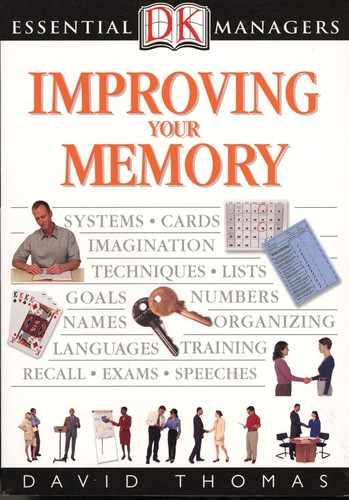
USING MENTAL ARITHMETIC
Train yourself to do simple arithmetic in
your head whenever the opportunity arises.
You could add up the cost of the items in your
grocery cart before you get to the checkout, for
example, or you could try dividing a restaurant
check between several people in your head. You
can always confirm the results on a calculator,
but as your mind becomes more efficient at
simple arithmetic, you will learn to rely on it
rather than the calculator. This keeps your short-
term memory agile and your brain exercised.
66
Applying Memory Techniques
Keeping Your
Memory Active
E
xercising your brain and keeping your
memory active increases the strength
of your memory as you get older. You will
find you are able to do things in later life
you might never have considered, such as
learning a language or a musical instrument.
DOING CROSSWORDS
AND WORD GAMES
Exercises that keep your memory and brain
active are those that require some mental
effort. Crosswords and word games are excellent,
because they push you to recall words that you
might not use regularly. This encourages you
to use them more often, so making you more
articulate. You can also stretch yourself mentally
by buying a book or a newspaper in a familiar
foreign language. Reading it will make you think
hard about any words you do not understand.
Play word games with your
children. It will help stretch
them in a fun way while
keeping you on your toes.
Learn to play a musical
instrument.This uses many
parts of the brain—and is
also rewarding.
Practice mental arithmetic
when you are stuck in traffic
or waiting for a bus.
Useful Exercises
Maintaining mental agility
Make use of a daily newspaper to stretch
your brain—get in the habit of doing
the crossword, or try translating some
passages into another language.

KEEPING YOUR
INTERESTS ALIVE
Apply the memory skills you are developing to
things that interest you. If you are learning to play
chess, for example, join your local club. If you are
learning how to memorize cards, join a bridge
club and try applying the techniques to your
game. Expand the range of material you are
learning by keeping up to date with developing
technologies.The Internet, in particular, can open
up a whole new world of information. Constant
learning keeps your memory active, drip-feeding
it new information to assimilate. Reading is a key
part of this process, so read as often as you can.
Vary the type of books and journals you read,
and cover as wide a range of material as possible.
You are always more likely to recall information
that interests you than information that you find
dull and boring, but every now and again try to
read something in a new area to increase the
scope of your memory and interests.
Keeping Your Memory Active
67
NAME: Richard
ISSUE: Losing
mental agility
OBJECTIVE: To keep
mind active
Richard is concerned
that he is slowing down
mentally. He has no interests
outside his job, and colleagues
find he has little conversation.
He hears about the importance
of keeping the brain active and
takes action. He begins by
buying a daily newspaper. He
finds articles that interest him,
and every evening uses the
Internet to research the topic
further. He does the crossword
at lunchtime. He buys a book
on one of the subjects that he
has become interested in, and
finds that reading stimulates
and stretches his mind. Richard
has now joined a reading
group. He reads a new book
every month, and is broadening
his range of interests.
Case Study
Using the Internet
The Internet is a wonderful resource. It
is an invaluable research tool for people
of all ages, and there is no end to the
information available on innumerable
topics. Many people find using email
enables them to share interests with
friends all over the world.
Uses Internet
to research
a topic
Emails
interesting
website to friend
..................Content has been hidden....................
You can't read the all page of ebook, please click here login for view all page.
